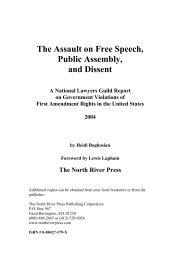Matthew MulchCrime and Punishmentin Private PrisonsI. IntroductionThis article attempts to analyze the relationship between prison privatizationand society’s understanding of punishment and criminal justice theory.Simply put, how are our traditional notions of deterrence, retribution, rehabilitation,incarceration, and restorative justice served when private actors,rather than public institutions, are meting out punishment?Prison privatization has received a great deal of coverage and analysis overthe past decade. The majority of this analysis has focused on the budgetaryquestions. Can privatized prisons help streamline an extremely expensiveindustry? Will competition result in cost cutting, skimping, and dangerousconditions for inmates and prison personnel? And, of course, will privatizationin this sector reduce costs in the long run? Or is it merely a short-termsolution?These issues <strong>have</strong> been addressed numerous times in a variety of ways.My goal here is to provide a more theoretical analysis of prison privatization.Cost and economic variables will play a role in the analysis; however,the primary goal of this article is to discuss how privatization shapes theconception of the criminal justice system through the eyes of policy makers,inmates, private correctional providers, and society itself. Moreover, thisarticle weighs the economic interests of private prison corporations againstthe effects of this industry on society as a whole. Economic theory and thebottom line will continue to drive the prison privatization debate. Yet, in asociety with a growing number of inmates housed in private facilities it isimportant to ask how our basic conceptions of criminal justice and punishmentare changing with the introduction of new private actors.II. The history and contemporary understandingof prison privatizationFirst, it is crucial to note that the distinctions between a public, government-runinstitution and a private facility are not always clear-cut. 1 Accordingto University of Colorado Professor Ahmed White:To the extent that the state is not ubiquitous, and that the prison is not entirely__________________________Matthew Robert Mulch is a graduate of the University of Denver, Sturm College ofLaw. He is a deputy public defender in Grand Junction, Colorado.
crime and punishment in private prisons71hermetic, some aspects of every prison are always private. From the labor of itsemployees, to provisions for inmates’ subsistence needs, to the land and capitalthat comprise the prison’s physical structure, each exemplifies every prison’sendemically, if partially, private character. In this sense, it is only possible toimagine a fully public prison either in a thoroughly totalitarian society or whenthe prison itself is (and this would negate its quality as a prison) an entirelyself-contained society. 2For the purposes of this article the use of the term privatization willprimarily focus on institutions where principal control rests with a privatecorporation through ownership or leasehold.Prison privatization is often mistakenly viewed as a modern concept,derived from laissez-faire economic theory first espoused towards the endof the 19th century. Interestingly, however, the first privatized prisons 3 predatelaissez-faire theory. 4 According to the Department of Justice, “Duringthe 18th century, the modern prison emerged . . . [and] the use of privatelyoperated facilities became popular.” 5 “Popular” is, of course, a relativeterm, and it should be noted that during this time few institutions resembledmodern prisons or jails. 6 During this period, government officials wouldoften appoint a head jailer in a particular locality. 7 While the jailer held aquasi-public position, it was not uncommon for him to sell the labor of hisinmates. 8 Moreover, jailers often accepted payment in return for preferentialtreatment. 9 Professor White has likened these post-colonial penitentiariesto European houses of corrections: private institutions that acted as jails,poorhouses, and factories. 10After the Civil War, southern prison populations soared, 11 and prison administratorsbegan the institutionalized practice of outsourcing inmate laborin a system called “convict leasing.” 12 According to a Justice Departmentreport “[b]y 1885,states had contracts with private enterprises to lease outprison labor.” 13 These contracts took a variety of forms:At some, companies outside the prison provided raw materials that were refinedin prison workshops and later sold by private companies. At others, prisonsleased their inmates out to private farms or other businesses if they could notproduce salable items within the prison. In a number of states, contractors paidthe prison a fee or a percentage of the profits for the right to employ convicts.. . . Even when prisons were not operated entirely by private entrepreneurs,inmates were used as a cheap source of labor. Prisoners often worked on farms,railroads, and mines, in addition to other public work programs .14Not surprisingly, convict leasing programs were rife with corruption. 15Many of the lessors were government officials. 16 Labor contracts were raucouslydisputed, and the states were often underpaid. 17 Nevertheless, for atime, the leasing system proved lucrative for those involved. 18


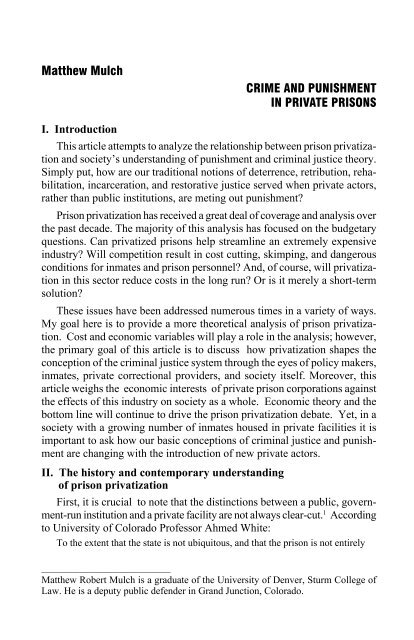
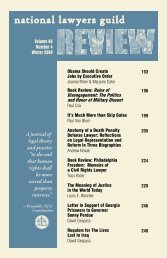

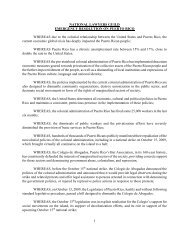





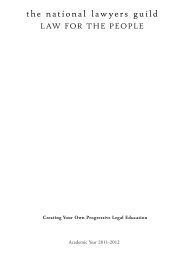
![NLGRev 68-2[1].indd - National Lawyers Guild](https://img.yumpu.com/30820772/1/167x260/nlgrev-68-21indd-national-lawyers-guild.jpg?quality=85)
